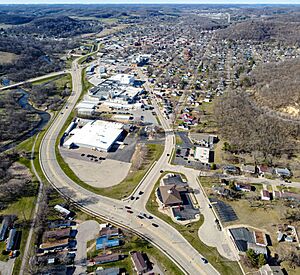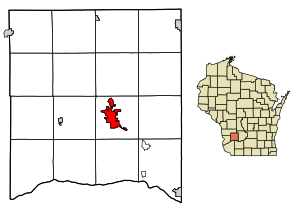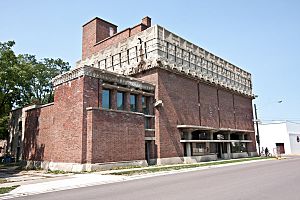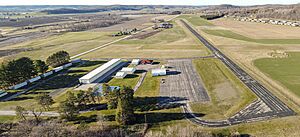Richland Center, Wisconsin facts for kids
Quick facts for kids
Richland Center
|
|
|---|---|

US-14, Wis-80/56, and the Pine River run through town
|
|

Location of Richland Center in Richland County, Wisconsin
|
|
| Country | |
| State | |
| County | Richland |
| Area | |
| • Total | 4.77 sq mi (12.41 km2) |
| • Land | 4.69 sq mi (12.14 km2) |
| • Water | 0.08 sq mi (0.22 km2) |
| Elevation | 728 ft (222 m) |
| Population
(2020)
|
|
| • Total | 5,114 |
| • Density | 1,091/sq mi (421.3/km2) |
| Time zone | UTC-6 (Central (CST)) |
| • Summer (DST) | UTC-5 (CDT) |
| ZIP Code |
53581
|
| Area code(s) | 608 |
| FIPS code | 55-67625 |
| GNIS feature ID | 1578616 |
Richland Center is a city in Richland County, Wisconsin, United States. It is also the county seat, which means it's the main city where the county government offices are located. In 2020, about 5,114 people lived there.
Contents
A Look at Richland Center's Past
How the City Began
Richland Center was started in 1851 by a man named Ira Sherwin Hazeltine. He came from Andover, Vermont. Hazeltine chose this spot because it had good water power, rich farmland, and was close to the center of Richland County. He even offered to give land to the county if Richland Center was chosen as the county seat. In 1852, the state of Wisconsin officially made Richland Center the county seat. The current Richland County courthouse was built here in 1889.
Early Transportation: The Railroad
In 1876, a special narrow gauge railroad line connected Richland Center to a bigger railroad network. This helped the town send and receive goods. At first, the tracks were made of maple wood! But by 1880, they were rebuilt with stronger iron tracks. In 1882, the train station caught fire and exploded. A new passenger station was built in 1909, and it's still used today as a visitor center.
Women's Rights and Important People
Richland Center played a big part in the women's suffrage movement in Wisconsin. This movement worked to give women the right to vote. In 1882, local women like Laura Briggs James and Julia Bowen started the Richland Center Woman's Club. This club became the largest group fighting for women's voting rights in Wisconsin.
Famous women's rights leader Susan B. Anthony even visited Richland Center in 1886. Later, Laura James' daughter, Ada James, became very important in the movement. She helped start the Political Equality League in 1909. The women's club also helped build the Richland Center City Auditorium, which was the city hall for many years.
Famous Architect Frank Lloyd Wright
The famous architect Frank Lloyd Wright was born in Richland Center in 1867. An architect is someone who designs buildings. The A. D. German Warehouse, finished in 1921, is the only building he designed in Richland Center. It shows his unique Mayan Revival style.
The Start of a Big Phone Company
The company known as GTE actually started in Richland Center! In 1918, three accountants bought the Richland Center Telephone Company. It was a small company with only about 1,466 phones. But they grew it into a huge company called General Telephone & Electronics Corporation (GTE). By 1969, GTE served 10 million phones across the country.
Where is Richland Center?
Richland Center is located at 43°20′16″N 90°23′5″W / 43.33778°N 90.38472°W. The city covers about 4.77 square miles (12.41 square kilometers). Most of this area is land, with a small part being water. The Pine River flows along the western side of the city.
Who Lives in Richland Center?
Population Changes Over Time
| Historical population | |||
|---|---|---|---|
| Census | Pop. | %± | |
| 1880 | 1,227 | — | |
| 1890 | 1,819 | 48.2% | |
| 1900 | 2,321 | 27.6% | |
| 1910 | 2,652 | 14.3% | |
| 1920 | 3,409 | 28.5% | |
| 1930 | 3,632 | 6.5% | |
| 1940 | 4,364 | 20.2% | |
| 1950 | 4,608 | 5.6% | |
| 1960 | 4,746 | 3.0% | |
| 1970 | 5,086 | 7.2% | |
| 1980 | 4,997 | −1.7% | |
| 1990 | 5,018 | 0.4% | |
| 2000 | 5,114 | 1.9% | |
| 2010 | 5,184 | 1.4% | |
| 2020 | 5,114 | −1.4% | |
| U.S. Decennial Census | |||
Richland Center in 2020
In 2020, the population of Richland Center was 5,114 people. Most residents, about 89.6%, were White. Other groups included Black or African American (1.3%), Asian (1.0%), and Native American (0.3%). About 5.7% of the population was Hispanic or Latino.
The average income for a household in the city was about $41,724. For families, it was around $57,813. About 16.5% of all people in the city lived below the poverty line. This included 20.2% of those under 18 years old. Most adults (90.2%) had finished high school or higher education. About 21.1% had a bachelor's degree or more.
Getting Around Richland Center
The Richland Airport (93C) helps people travel to and from the city. It serves Richland Center and nearby towns.
Learning in Richland Center
The city is part of the Richland School District. This district includes local schools for students.
Richland Center used to have a college campus called the University of Wisconsin–Platteville Richland. It was a place where students could complete their first two years of college. However, this campus closed in May 2023.
Famous People from Richland Center
Many interesting people have connections to Richland Center. Here are a few:
- Svetlana Alliluyeva, daughter of Joseph Stalin
- Lynda Barry, a cartoonist
- Ann Walsh Bradley, a Wisconsin Supreme Court justice
- Raymond Leo Burke, a Roman Catholic Cardinal
- Bradie Ewing, an NFL football player
- Joe Garden, an author and writer for The Onion
- Ada James, a leader in the women's right to vote movement
- Deborah Polaski, an international opera singer
- Vernon Wallace Thomson, a former Governor of Wisconsin
- Frank Lloyd Wright, a world-famous architect
Cities Richland Center is Friends With
Richland Center has two sister cities. These are cities in different countries that form special friendly relationships:
 Santa Teresa, Nicaragua
Santa Teresa, Nicaragua Yueqing, China
Yueqing, China
Images for kids
See also
 In Spanish: Richland Center (Wisconsin) para niños
In Spanish: Richland Center (Wisconsin) para niños
 | William M. Jackson |
 | Juan E. Gilbert |
 | Neil deGrasse Tyson |








